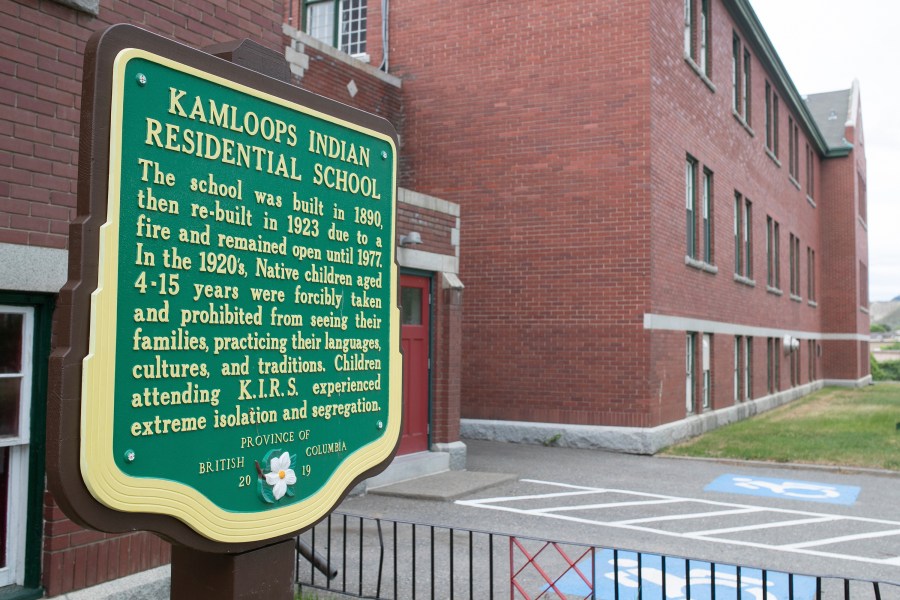TORONTO (AP) — Canadian Prime Minister Justin Trudeau asked Sunday that flags at all federal buildings be flown at half-staff to honor more than 200 children whose remains have been found buried at what was once Canada’s largest Indigenous residential school — one of the institutions that held children taken from families across the nation.
The Peace Tower flag on Parliament Hill in the nation’s capital of Ottawa was among those lowered to half-staff.
“To honor the 215 children whose lives were taken at the former Kamloops residential school and all Indigenous children who never made it home, the survivors, and their families, I have asked that the Peace Tower and all federal buildings be flown at half-mast,” Trudeau tweeted.
Mayors of communities across Ontario, including Toronto, Ottawa, Mississauga and Brampton, also ordered flags lowered to honor the children.
Chief Rosanne Casimir of the Tk’emlups te Secwepemc First Nation in British Columbia said the remains of 215 children, some as young as 3 years old, were confirmed last weekend with the help of ground-penetrating radar.
She described the discovery as “an unthinkable loss that was spoken about but never documented at the Kamloops Indian Residential School.″
From the 19th century until the 1970s, more than 150,000 First Nations children were required to attend state-funded Christian schools as part of a program to assimilate them into Canadian society. They were forced to convert to Christianity and not allowed to speak their native languages. Many were beaten and verbally abused, and up to 6,000 are said to have died.

The Canadian government apologized in Parliament in 2008 and admitted that physical and sexual abuse in the schools was rampant. Many students recalled being beaten for speaking their native languages. They also lost touch with their parents and customs.
Indigenous leaders have cited that legacy of abuse and isolation as the root cause of epidemic rates of alcoholism and drug addiction on reservations.
Plans are underway to bring in forensics experts to identify and repatriate the remains of the children found buried on the site.
The Kamloops school operated between 1890 and 1969, when the federal government took over operations from the Catholic Church and operated it as a day school until it closed in 1978.
Latest News
- SAA-1485
- American Airlines lifts ground stop order after technical issue w/featured image
- American Airlines lifts ground stop order after technical issue
- LiveStream
- Diddy’s anonymous accusers may still be revealed (old)
The National Truth and Reconciliation Commission has records of at least 51 children dying at the school between 1915 and 1963.
Perry Bellegarde, chief of the Assembly of First Nations, said while it is not new to find graves at former residential schools, it’s always crushing to have that chapter’s wounds exposed.
The chief of the Mississaugas of the Credit First Nation, R. Stacey LaForme, wrote Trudeau on Saturday to ask the government to lower the flags and declare a national day of mourning.
“There is a lot more to be done but first and foremost, we need to do this to show love and respect to the 215 children, all of the children, and their families,” LaForme said in a statement. “This should be a moment that the country never forgets.”
Sol Mamakwa, an Indigenous opposition legislator who represents the Ontario riding of Kiiwetinoong, called on the province and Canadian government to work with all First Nations to look for remains at other defunct residential schools.
“It is a great open secret that our children lie on the properties of the former schools — an open secret that Canadians can no longer look away from,” Mamakwa said. “In keeping with the Truth and Reconciliation Commission’s Missing Children Projects, every school site must be searched for the graves of our ancestors.”
Toronto Mayor John Tory said city flags would stay lowered for nine days — 215 hours — to represent each life.
“This sad story is shocking but not surprising to students of history, I don’t think we know yet when these deaths occurred,” said Nelson Wiseman, a political science professor at the University of Toronto.
“Canada of yesteryear is not the Canada of today,” he said.






